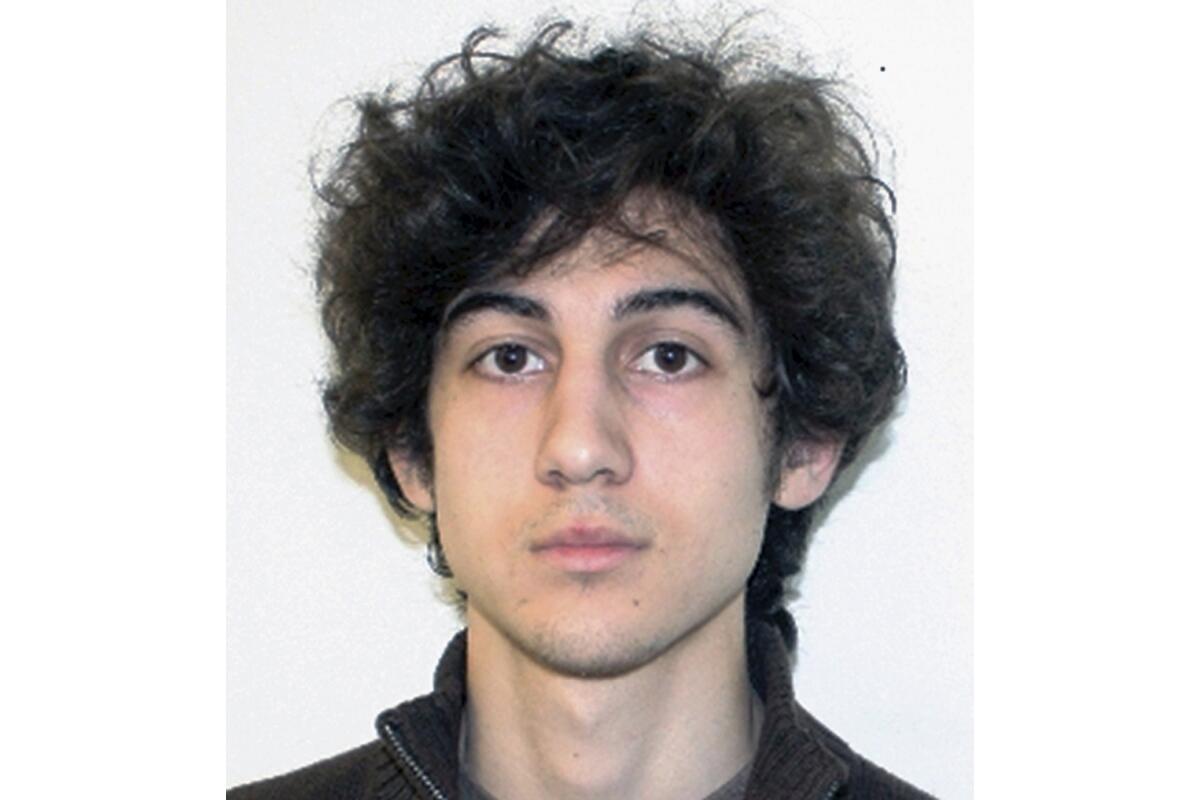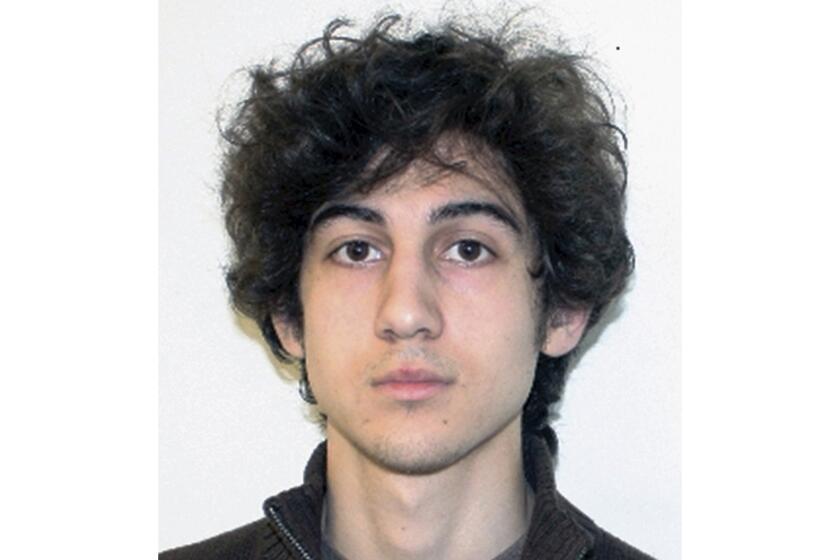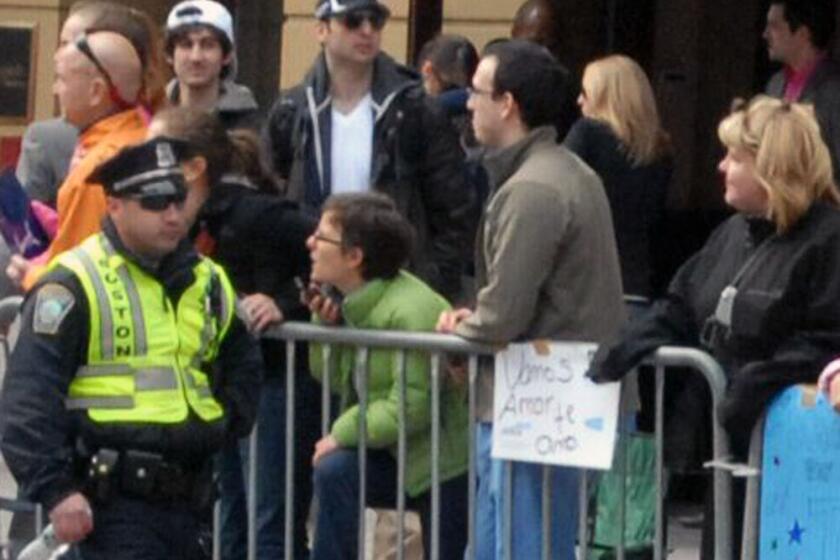Court weighs tossing Boston Marathon bomber’s death sentence

- Share via
BOSTON — Boston Marathon bomber Dzhokhar Tsarnaev’s attorney on Tuesday urged a federal appeals court to throw out the 29-year-old’s death sentence because of juror misconduct claims, just months after it was revived by the nation’s highest court.
Tsarnaev is making a renewed push to avoid execution after the Supreme Court last year reinstated the death sentence imposed on him for his role in the bombing that killed three people and injured hundreds near the finish line of the marathon on April 15, 2013.
His lawyers are challenging issues that weren’t considered by the Supreme Court, including whether the trial judge wrongly denied his challenge of two jurors who, defense attorneys say, lied during jury selection questioning.
One juror said she had not commented about the case online but had retweeted a post calling Tsarnaev a “piece of garbage.” Another juror said none of his Facebook friends had commented on the trial, even though one had urged him to “play the part” so he could get on the jury and send Tsarnaev to “jail where he will be taken of,” defense attorneys say. Tsarnaev’s lawyers raised those concerns during jury selection, but the judge chose not to look into them further, they say.
The high court agreed with the Biden administration’s argument that an appeals court was wrong to throw out Dzhokhar Tsarnaev’s death sentence.
“This case was tried in Boston on a promise ... that despite the extraordinary impact of the marathon bombing on this community,” a through questioning of potential jurors would remove anyone unqualified, Tsarnaev attorney Daniel Habib told the 1st U.S. Circuit Court of Appeals judges. “That promise was not kept.”
The Justice Department has continued to push to uphold Tsarnaev’s sentence even after Atty. Gen. Merrick Garland in 2021 imposed a moratorium on federal executions while the department conducts a review of its policies and procedures. The department has not indicated how long it might maintain the hold, which came after the Trump administration put to death 13 inmates in its final six months.
President Biden has said he opposes the death penalty and will work to end it but has taken no action to do so while in office.
The moratorium doesn’t prevent federal prosecutors from seeking the death penalty, as they are in the case of a man on trial for killing eight people on a New York City bike path in 2017.
William Glaser, a Justice Department lawyer, said the trial judge did nothing wrong in his handling of the jurors in the Tsarnaev case. Glaser acknowledged that the jurors made inaccurate statements but said other disclosures they made to the court suggest that they were merely misremembering.
Twin blasts near the finish line kill three people and leave scores injured.
“There is no indication in this record that the inaccuracies were the kind of knowing dishonesty that would lead to disqualification,” Glaser said.
But Judge William J. Kayatta Jr. questioned how the trial judge could know that without looking further into Tsarnaev’s claims. And Judge O. Rogeriee Thompson told the Justice Department lawyer she found it difficult to see how Tsarnaev can’t plausibly claim that the juror told to “play the part” was knowingly lying.
“If, for instance, the Facebook friend had said, ‘Get on the jury and make sure that the death penalty isn’t imposed,’ it’s hard for me to believe that you wouldn’t be in here arguing the opposite of what you are arguing now,” she told Glaser.
Some survivors of the bombing who attended the hearing met briefly with Massachusetts U.S. Atty. Rachael Rollins afterward outside the courtroom. Marc Fucarile, who lost a leg and suffered other serious injuries in the blast, said he showed up at the proceeding to let the judges know that survivors are “still paying attention to what they are doing.”
“At a certain point, we need to draw a line in the sand and say enough is enough. It is not in question what he did,” Fucarile told the Associated Press.
Boston bombing suspects Tamerlan and Dzhokhar Tsarnaev emerged from turbulence in the former Soviet Union into a hope-filled future in the U.S. Then something changed.
Tsarnaev’s lawyers acknowledged at the beginning of his trial that he and his older brother, Tamerlan Tsarnaev, set off the two bombs that killed Lingzi Lu, a 23-year-old Boston University graduate student from China; Krystle Campbell, a 29-year-old restaurant manager from Medford, Mass.; and 8-year-old Martin Richard of Boston.
They have argued, however, that their client shouldn’t be put to death, saying his brother radicalized him and was the mastermind of the attack.
Tsarnaev was convicted in 2015 of all 30 charges against him, including conspiracy and use of a weapon of mass destruction and the killing of MIT Police Officer Sean Collier during the brothers’ getaway attempt. Tamerlan Tsarnaev died in a gun battle with police a few days after the bombing.
The 1st Circuit in 2020 overturned Tsarnaev’s death sentence and ordered a new penalty-phase trial to decide whether he should be executed, finding that the judge did not sufficiently question jurors about their exposure to extensive news coverage of the bombing. But the Supreme Court justices, by a 6-3 vote, agreed with the Biden administration that the 1st Circuit’s ruling was wrong.
More to Read
Sign up for Essential California
The most important California stories and recommendations in your inbox every morning.
You may occasionally receive promotional content from the Los Angeles Times.















